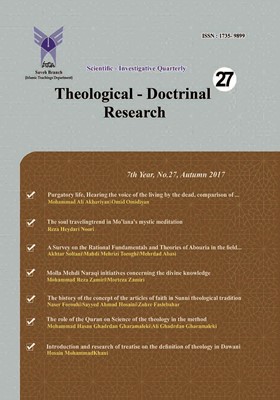-
-
List of Articles
-
Open Access Article
1 - Purgatory life, Hearing the voice of the living by the dead, comparison of opinions of Ibn Taymiyyah and Ibn Qayyim al-Jawziyya with the viewpoint of Wahhabism
Omid Omidian -
Open Access Article
2 - The soul travelingtrend in Mo’lana’s mystic meditation
-
Open Access Article
3 - Molla Mehdi Naraqi initiatives concerning the divine knowledge
-
Open Access Article
4 - The history of the concept of the articles of faith in Sunni theological tradition
-
Open Access Article
5 - The role of the Quran on Science of the theology in the method
-
Open Access Article
6 - introduction and research of treatise on the definition of theology in Dawani
-
Open Access Article
7 - A Survey on the Rational Fundamentals and Theories of Abouria in the field of Hadith
mehrdad abbasi Akhtar Soltani
-
The rights to this website are owned by the Raimag Press Management System.
Copyright © 2017-2026







